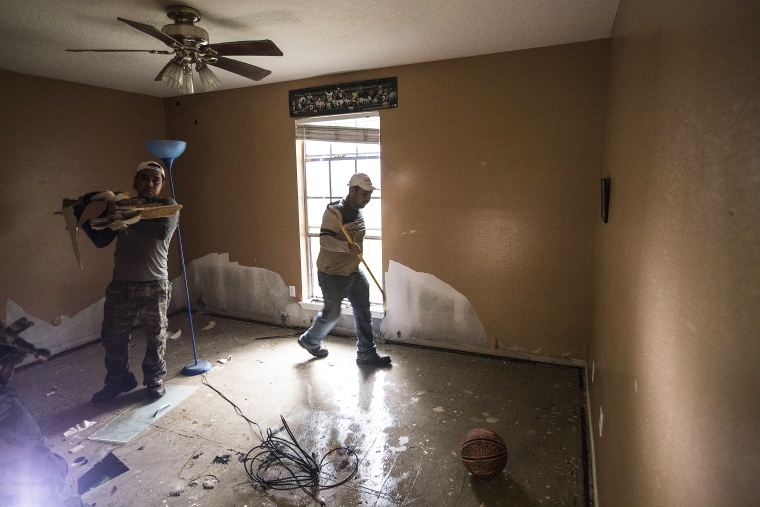President Donald Trump's promises to rebuild Harvey-slammed Houston "better than ever" may run aground of some of his own policies.
"We are going to get you back and operating immediately," Trump said during a visit to Corpus Christi on Tuesday, during which he pledged to provide model recovery assistance to the decimated region. "We want to do it better than ever before. We want to be looked at in five years, in 10 years from now as, 'This is the way to do it.'"
That's if they can find the people to do it.
"One of the challenges is the lack of workers," said Robert Dietz, chief economist for the National Association of Homebuilders. "The storm will increase the demand for remodeling and repair and will require the same kind of workers from the pool of single family construction."
That pool was already getting shallow, according to a survey the association conducted before Hurricane Harvey hit.
More than 70 percent of builders reported shortages of framing crews and carpenters, according to the survey. And more than 60 percent reported an ongoing dearth of drywall installers, concrete workers, and bricklayers.
Related: Harvey Is Gone, But Houston Is Still Flooding
This has been driven in large part by declines in the number of skilled construction workers, with net migration from Mexico down since 2009.
Diane Swonk is a Chicago-based independent economist who speaks regularly with construction and building companies as part of her research into the housing market.
"They can't get anyone to show up for fear of getting deported," she said.
Fearful Immigrants Further Deplete a Declining Workforce
Undocumented immigrant inflows had already slowed to 100,000 a year — a far cry from the half-million who padded out the workforce in the late 1990s, according to Pew Research Center estimates.
But Trump's pledge to start mass deportations and build a wall along the Mexican border appear to have resulted in an increase of immigrants staying close to home, according to the White House. There has also been a 40 percent uptick in ICE enforcement actions, the agency reported.
"There's a lot of misinformation circulating and rumors and misunderstanding of the way immigration works," thanks to leaked copies of unsigned executive orders and the Administration's "restatement of existing law as if it's something new," said Jackie Vimo, a policy analyst at the National Immigration Law Center. That's encouraging fearful immigrants to stay home whenever they can.
Related: Harvey Could be Costliest Storm Ever
On Wednesday, a federal judge temporarily blocked a new Texas law that would have enacted a so-called ban on sanctuary cities, a Trump-backed measure that was set to go into effect Friday.
And the tight labor pool in turn has exacerbated a shortage of affordable housing in the Houston market, along with builders focusing on higher-end luxury developments, and long-time local community resistance to the construction of lower-income housing.
Now add a 500-year flood.
New Tariffs Slapped on Lumber
Those of smaller means are likely to face a tougher time than other economic classes for affordable housing. The city is third-worst in the nation for housing available to extremely low-income households, according to an analysis of Housing and Urban Development and U.S. Census data by the National Low Income Housing Coalition.
The middle class will likely fare a little better, with a small surplus of 105 housing units per 100 households.
It will be easier still for relocated wealthy homeowners to find new housing, owing to the glut of luxury homes and apartments on the market following a decline in jobs in oil and gas and related industries after oil prices dropped.
And when they kick in, Trump's protectionist timber tariffs on Canadian lumber imports are likely to drive up material costs for remodeling and new construction by at least 10 percent, said Dietz.
"We don't produce enough lumber in the U.S.," he said. The storm's destructiveness "just increases the demand."
The restrictions on labor and lumber, "are not productive policies from an economic standpoint," said Swonk. "The fear is they will set Houston back if you can't rebuild."

